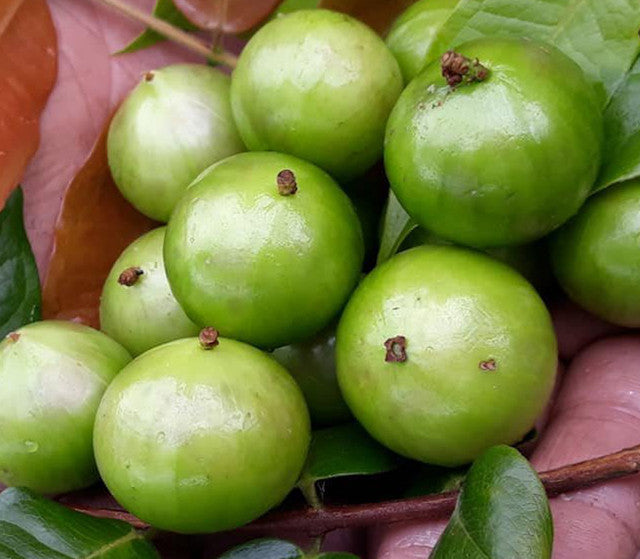Love it? Add to your wishlist
Your favorites, all in one place. Shop quickly and easily with the wishlist feature!
[message]
[title]
[message]




Veliyath Gardens
Couldn't load pickup availability
White Honey Jaboticaba (Plinia aureana "Branca Mel"): A Rare Tropical Treasure with Sweet Rewards
Among the many captivating members of the Jaboticaba family, the White Honey Jaboticaba, also known as Aurean Full Moon, holds a distinctive place. Botanically identified as Plinia aureana "Branca Mel", this exceptional cultivar is cherished for its larger-than-average fruit size, subtle honeyed flavor, and early, frequent fruiting cycles. Native to Minas Gerais, Brazil, this plant has become a highly prized addition to rare fruit gardens and exotic nurseries worldwide.
At Veliyath Gardens, this rare tropical delight is now available for enthusiasts seeking beauty, taste, and nutrition in one remarkable tree.
Common Names:
White Honey Jaboticaba
Aurean Full Moon
Branca Mel (Portuguese)
Botanical Name: Plinia aureana "Branca Mel"
Native Region: Minas Gerais, Brazil
Now Grown In:
Brazil – Home to many Jaboticaba cultivars, including Branca Mel
Thailand – Cultivated in tropical orchards for its appeal and rarity
United States (Florida, Hawaii) – Sought after by rare fruit collectors
Shape and Texture: Round, smooth-skinned fruits with occasional small sepal remnants
Size: Up to 3 cm in diameter, making it the largest among Plinia aureana types
Color: Translucent to pale greenish-white when ripe
Seeds: Fewer and smaller compared to other varieties
Pulp: Juicy, clear, and slightly honeyed
The Branca Mel variety stands out from other Jaboticaba types due to its larger fruit, non-ribbed surface, and a sweet, mildly floral aftertaste that resembles a hint of wild honey.
Much like its dark-skinned relatives, the White Honey Jaboticaba offers notable nutritional and medicinal qualities. Although research on this particular cultivar is still emerging, its genetic relation to other Plinia species suggests several health-supporting elements.
Vitamin C Rich – Enhances immunity and supports collagen production
Dietary Fiber – Promotes healthy digestion and gut health
Antioxidants – Aids in combating oxidative stress and inflammation
Polyphenols and Anthocyanins – Known for their anti-aging and anti-cancer potential
Low Glycemic Index – A good fruit choice for those managing blood sugar
Its gentle sweetness and natural phytochemicals also make it ideal for detox diets and refreshing summer snacks.
Taste:
Mildly sweet with a floral finish
Delicate honey notes with a crisp, juicy bite
No overpowering acidity or bitterness
Culinary Uses:
Fresh Consumption: A perfect garden snack
Fruit Bowls & Salads: Adds texture and mild sweetness
Juices or Syrups: Blends well into tropical drinks
Gourmet Desserts: Rare ingredient for fruit compotes or jellies
Fermented Beverages: Can be turned into unique wines or fruit vinegars
This fruit's subtle flavor is best appreciated when eaten fresh. Its light sweetness is refreshing and uplifting—ideal for children and adults alike.
Growth Habit:
A small-to-medium evergreen tree
Compact canopy with decorative foliage
Slow-growing but highly ornamental
Foliage:
Leaves are shorter, broader, and smoother than typical Plinia aureana
Younger leaves emerge with a soft reddish hue, turning deep green with age
Height: Typically grows up to 2 to 4 meters, making it suitable for small gardens or container cultivation
Root System: Non-invasive, suitable for urban landscaping
Climate: Best suited for tropical and sub-tropical regions
Soil: Prefers well-draining, slightly acidic soils rich in organic matter
Watering: Requires consistent watering, especially during flowering and fruiting
Sunlight: Thrives in full sun to partial shade
Fruiting Time: Begins fruiting in 4 to 5 years, often fruiting 3 to 4 times per year
Maintenance Level:
Moderate – Needs regular watering and organic feeding
Pruning for shape and air circulation is beneficial
With its manageable size and high productivity, the White Honey Jaboticaba is ideal for both beginners and experienced fruit growers.
Harvesting: Fruits ripen directly on the trunk and main branches. Gently twist or snip off when fully mature
Storage:
Best consumed fresh within a few days of harvest
Refrigerate to keep fresh for up to a week
Can be preserved as syrups, frozen pulp, or fermented beverages
Unlike many fruits that ripen post-harvest, Jaboticabas must be picked when fully ripe to enjoy their true flavor.
Though still relatively unknown outside Brazil and tropical Asia, Branca Mel is gaining interest among rare fruit growers. In Brazilian home gardens, the tree is often planted near patios or paths for convenient harvesting and to share its bounty with family and neighbors.
As a fruit that grows directly on the trunk (cauliflorous), it holds symbolic value in some communities—representing abundance, nourishment, and nature’s generosity.
A Collector’s Gem: A must-have for those passionate about unique and rare fruits
Garden Appeal: Enhances the aesthetic of your fruit garden with its striking trunk-fruits and decorative leaves
Health Partner: Natural source of nutrients that supports wellness goals
Family Delight: Children are especially fascinated by the tree’s fruiting pattern
Gifting Value: A thoughtful gift for plant lovers and garden enthusiasts
The White Honey Jaboticaba (Plinia aureana "Branca Mel") is more than just a novelty—it is an early-bearing, nutrient-rich, and beautifully ornamental fruit tree that brings the tropics closer to home. Whether for its gourmet-quality fruits, low-maintenance nature, or symbolic abundance, this cultivar is an exceptional choice for your edible landscape.
At Veliyath Gardens, we are proud to offer this rare and remarkable fruit tree for those who appreciate the joy of cultivating something truly extraordinary.
Make space for the White Honey Jaboticaba in your life—its sweet reward is worth every season.
Climate: Best suited for tropical and sub-tropical regions
Soil: Prefers well-draining, slightly acidic soils rich in organic matter
Watering: Requires consistent watering, especially during flowering and fruiting
Sunlight: Thrives in full sun to partial shade
Vitamin C Rich – Enhances immunity and supports collagen production
Dietary Fiber – Promotes healthy digestion and gut health
Antioxidants – Aids in combating oxidative stress and inflammation
Polyphenols and Anthocyanins – Known for their anti-aging and anti-cancer potential
A Collector’s Gem: A must-have for those passionate about unique and rare fruits
Garden Appeal: Enhances the aesthetic of your fruit garden with its striking trunk-fruits and decorative leaves
Health Partner: Natural source of nutrients that supports wellness goals
Family Delight: Children are especially fascinated by the tree’s fruiting pattern





